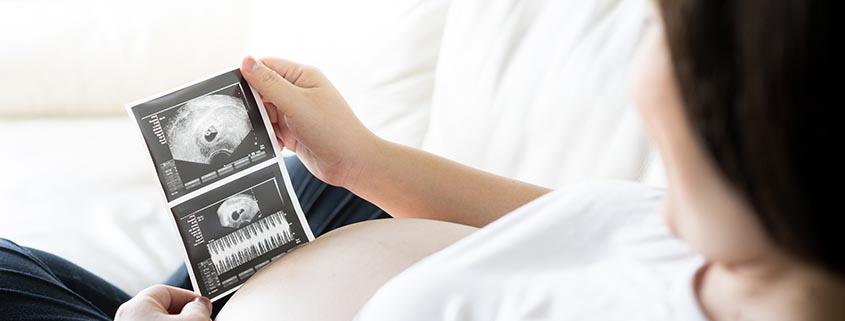Body Changes During Pregnancy: Second Trimester
Doesn’t it seem like just yesterday you used the home pregnancy test kit and found out that you’re expecting? Time flies quickly as you wait for your little bundle of joy and before you know it, you’ve entered the second trimester of your pregnancy.
What is the second trimester?
A pregnancy lasts for approximately 40 weeks and is grouped into three trimesters. The second trimester starts at week 13 and ends at week 28. This middle phase of pregnancy roughly includes the months 4, 5 and 6.
The body continues to change during this term but the good news is that this trimester is known to be the most comfortable phase of pregnancy. Women who had a tough time dealing with morning sickness during the early days of pregnancy, are likely to feel better and experience increased energy levels. As your body prepares for the growing baby, here’s what you can expect during the ‘golden phase’ of your pregnancy.
Body Changes During Pregnancy: Second Trimester
Here are some of the body changes you will notice in your second trimester of the pregnancy:
- Growing Baby Bump
- Breast Changes
- Skin Changes
- Lustrous Locks
- Increased Vaginal discharge
Growing baby bump
It’ll soon be time to start wearing maternity clothes. You’ll put on weight gradually, 5-7 kgs on average and your belly will get rounder. The growing bump also brings a lot of excitement as this is the phase when you’ll feel your baby’s movements for the first time. This usually happens between 16 to 22 weeks and at first, these movements feel like slight flutters. As the baby grows, the movements become more distinct and kick-like.
Note that it is okay to not put on weight in the first trimester, but you should start gaining healthy weight in the second trimester. If you haven’t been able to gain the desired weight, following the simple guidelines on what to eat during pregnancy by Prega News will not only ensure proper growth of your baby but also help you avoid certain pregnancy related discomforts.
Breast Changes
The soreness and tenderness of the breasts experienced in the first trimester will subside but the breasts will continue to grow, preparing you for breastfeeding. The enlarging milk glands and fat deposits cause the breasts to grow. The skin around the nipples tends to darken and small bumps appear around the nipples. You may also experience some amount of yellowish fluid, colostrum, leaking out of the breasts occasionally. But don’t worry, you won’t run out of colostrum before the baby is born. Your hormones will ensure that the breasts do not produce a large amount of milk until your baby is born.
To accommodate your growing breast size, it is advisable to purchase a larger bra. Wearing a bra that fits you well will keep you more comfortable. If you are experiencing leakage of colostrum, then try inserting nursing pads into your bra to absorb milk and prevent stains.
Skin Changes
With your belly and breasts growing rapidly, you will notice the appearance of stretch marks. The appearance and extend of stretch marks can vary depending on each woman’s weight gain. Besides stretch marks, women may also notice dry, itchy skin as well as pigmentation over the forehead and cheek may appear at about 24th week. Changes in skin conditions can be attributed to hormonal fluctuations in the body during pregnancy.
While some women enjoy the famous ‘pregnancy glow’, others experience pregnancy acne. An increase in the level of hormones called Androgen can cause the glands in the skin to grow and produce more sebum. This sebum can clog pores and lead to inflammation and acne. Women with a history of acne have a higher chance of experiencing breakouts during pregnancy. But the good news is that pregnancy acne is temporary and will clear up once the hormone levels return to normal.
Lustrous Locks
Hormonal changes during pregnancy also affect hair health by changing the hair’s natural life cycle. Due to the increased production of the hormone estrogen, lesser strands of hair are shed daily. This results in hair appearing thick and shiny. However, some women also tend to notice hair fall and dull hair due to these hormonal changes. But fret not, these 5 ways for perfect hair during pregnancy will help you maintain your lustrous locks.
Increased Vaginal discharge
You may notice an increase in white vaginal discharge during the second trimester. This sticky, clear or white, discharge, called leukorrhea, is made of cervical and vaginal secretions and is completely normal. An increase in the production of estrogen and blood flow to the vaginal area leads to an increased amount of discharge. However, if the discharge is foul-smelling, unusual in color and if it is accompanied by pain, itching or burning sensation in your vaginal area, it is best to consult your gynecologist.
Keep in mind that some amount of spotting, especially during the early days of pregnancy is normal. However, you don’t get your period during pregnancy; bleeding is a cause of concern and should be brought to your doctor’s attention immediately.
Besides these major changes, you may also notice some common discomforts in the second trimester. These include
- Nasal Congestion
- Nosebleed
- Bleeding gums
- Back pain
- Swelling of legs and feet
- Heartburn
If you are concerned about any of these symptoms, then don’t hesitate to check with your gynecologist. While most pregnancies are uncomplicated, it is best to educate yourself regarding some common pregnancy complications so that you can seek timely medical help if and when required. Make sure you don’t miss any of your scheduled appointments, as it is important for the doctor to monitor your health as well as your baby’s growth.
How to stay healthy during pregnancy second trimester
The most noticeable changes during the second trimester are dry, itchy skin and the appearance of stretch marks due to hormonal changes and growing belly. To keep your skin healthy and glowing, it is essential to drink lots of water and moisturize regularly with a chemical-free lotion.
It is equally important to keep your teeth and gums healthy as poor dental hygiene is linked to premature labor. Rinsing with lukewarm salt water and using soft brush can reduce irritation.
The second trimester is also a good time to become more physically active because the discomforts of early pregnancy such as vomiting and nausea have usually gone away. Being active during pregnancy will not only make you feel better but also keep you healthy and strong. Some exercises such as squatting, pelvic tilts and Kegels help the body prepare for labor and normal delivery.
Make sure you eat well and get enough calories to maintain a healthy weight. Foods that contain iron, protein and other essential nutrients will help your baby grow. It is best to avoid raw meats, unpasteurized milk products and fish with high amounts of mercury during pregnancy.
The second trimester is an exciting part of your pregnancy and a chance to appreciate the perks of pregnancy such as glowing skin and lush hair. Also, don’t forget to enjoy feeling good, enjoy eating and enjoy the fact that you’re going to be a mother soon! If you want to know just how soon you’ll be able to hold your little one in your arms, use this easy Due Date Calculator by Prega News.
Frequently Asked Questions
- What happens in the 2nd trimester of pregnancy?
The first trimester symptoms such as nausea and vomiting begin to improve and you experience increased energy levels. The uterus expands to accommodate the growing baby and you feel the baby’s movements for the first time during this phase.
- What should you not do in your second trimester?
You should avoid strenuous exercises or activities that may cause injury to your stomach. You should also avoid alcohol, smoking and limit the intake of caffeine.
- What months are 2nd trimester?
The second trimester are the months 4,5 and 6 of your pregnancy.
- How should I sleep during second trimester?
As the belly grows, it is advisable to sleep on your side. Left side is considered ideal as it allows for optimal blood flow to the heart and eventually to the baby. You may also choose to use a pregnancy pillow to get comfortable with side sleeping.
- How do you know your second trimester is going well?
The second trimester is famously known as the ‘honeymoon period’ of pregnancy. If you’ve got your energy and appetite back and the ultrasound scan shows normal development of the baby, then everything is going well in the second trimester. A regular follow-up with your Gynecologist can be more reassuring.
- What trimester is the hardest?
Each woman responds differently to pregnancy. For most women, first trimester of the pregnancy is often the hardest.
- How safe is sex during second trimester?
Sex during the second trimester is generally considered safe. However, your gynecologist may suggest otherwise depending on your pregnancy condition.
Disclaimer:This blog solely intended for the educational/informational/awareness purposes and is not a substitute for any professional medical advice, diagnosis or treatment. Please consult your doctor/healthcare professional before acting on the information provided on the blog. Reliance on any or all information provided in the blog, is solely at your own risk and responsibility. Mankind Pharma Limited shall not be held liable, in any circumstance whatsoever.










































Leave a comment